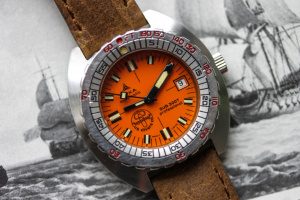Difference between revisions of "Doxa Sub 300"
m (Richard moved page Doxa 300 to Doxa Sub 300) |
Revision as of 14:53, 30 April 2020
Doxa Sub 300
History
In the late 1960’s Mr. Urs Eschle was product manager on Doxa watches. He and his team decided to create an affordable but rugged sports diver watch for leisure and professional divers, which had to be comfortable, reliable and legible. The Doxa Sub 300 was born in 1967; a diver’s watch being designed from scratch incorporating excellent technical and design elements. The watch had a rotating unidirectional bezel with US Navy Non-Decompression dive limits. This corresponded to the time on the inner bezel ring. Therefore a diver could set the bezel’s zero mark to line up with the minute hand upon descending, and then refer to the no-deco limits markings, along with his depth gauge, to determine when it was time to safely ascend. The highly legible orange dial, the substantial minute hand with that almost dwarfs the hour hand, the massive tonneau-shape case that provided comfort and protection of the crown, and the ‘expando’ 'bead-of-rice' bracelet made the Doxa Sub a favorite among Calypso divers with Jacques Cousteau.
Doxa incorporated in 1969 the HRV (Helium Release Valve) and the Doxa Sub 300T Conquistador was the first diver with a HRV (Helium Release Valve) available to the general public .Doxa and Rolex co-developed this technical solution (Rolex submitted the patent in 1967 and equipped prototype Submariners ref.5513/5514 and patent pending Sea Dweller ref.1665) but released its Sea-Dweller model with a HRV valve only in 1971.
The company U.S. Divers was so pleased with the Sub 300 that it bought the rights to be sole distributor of the watch in the United States and put its familiar “Aqua-Lung” logo right on the dial. It can been seen on the wrist of almost every Calypso diver in that era, along with the great Sub 200 T-Graph the chronograph version of the 300. Produced in three color variations (Orange, Black, Silver, similar to the Sub 300), this chronograph had a thicker case and a bigger caliber. The cal.287 by Doxa was based on the high grade Eberhard cal.310-82 and used a column-wheel mechanism.
Links
Credits - https://monochrome-watches.com/cousteau-and-the-timepieces-of-the-calypso-team-part-3/
